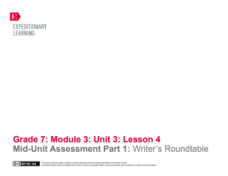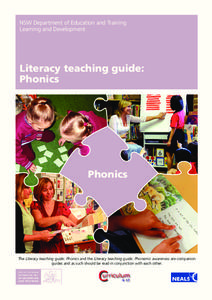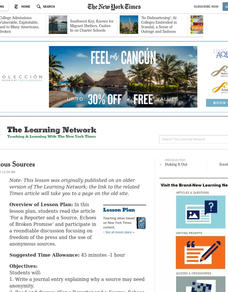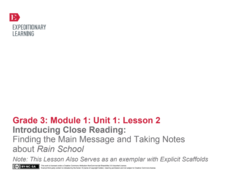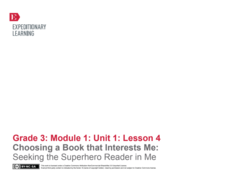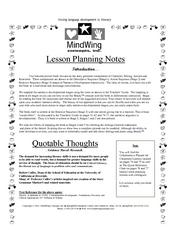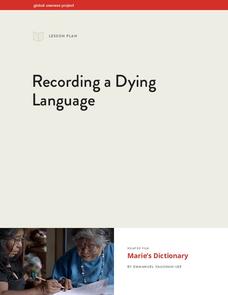EngageNY
Writing: Drafting Body Paragraphs and Revising for Language
Begin the drafting phase of the writing process with a lesson plan focused on logically writing three body paragraphs. Then, revise the writing to make it more formal after a teacher-directed mini-lesson plan. Each paragraph highlights...
PBS
Interviewing: The Art of Asking Questions
Interviewing skills are important, even outside of a news reporter's desk or employer's office. Take your class through the process of interviewing people they don't know with a set of case studies featuring journalists and various...
Lakeshore Learning
What's Next? Sequencing Story
First, next, then, and, finally are the words in focus of a sequencing lesson plan. Scholars listen to a read aloud of the tale "Lost in the Fog," and take part in a grand conversation about the story's sequence of events. They then show...
Library Sparks
Reference Tools Vocabulary Challenge
Students love the opportunity of going to the library to jump into that one comfy chair in the whole room with a book, or be a lucky one to get to the computers before anyone else. But knowing how to locate books and other reference...
EngageNY
Mid-Unit Assessment Part 1: Writer’s Roundtable
Hear ye, hear ye, it's time for a writer's roundtable! Scholars clarify their thinking about their narrative writing project by engaging in a fishbowl discussion about their plans. As members within the inner circle discuss the topic,...
Curated OER
Non-Verbal Communication
Many developmentally disabled students struggle with accurately conveying messages and interpreting those of others around them, especially when they are non-verbal. This lesson contains fun activities and exercises, such as talking with...
Curated OER
Matthew Henson
Discuss the work of Matthew Henson, an African American who traveled to the North Pole with Robert Peary. After reading the story "Matthew Henson" by Maryann N. Weidt, learners answer questions by drawing inferences and conclusions,...
Project Noah
Writing Goes Wild
Young scientists develop their observation and writing skills as they craft and then post a detailed description of a plant or animal they have spotted and photographed.
Vanderbilt University
Literacy Teaching Guide: Phonics
You don't have to be a teacher in New South Wales to appreciate this phonics teaching guide. The 73-page packet is packed with information about the principles of effective phonics programs, teaching methods, sequencing, key strategies,...
Curated OER
Amelia Earhart
Your class can learn about Amelia Earhart and practice important comprehension skills here. Learners answer questions about cause and effect, compare texts, and discuss similes and metaphors after reading Amelia Earhart: Free in the...
Curated OER
The First (and Last) Words
What does "freedom of speech" mean to your class, especially in the context of Internet communications? In round-table discussion format, middle and high schoolers address the issues discussed in "State Legislatures Across U.S. Plan to...
Curated OER
Anonymous Sources in the Media
When do people ask for anonymity? Why? After reading the New York Times article "For a Reporter and a Source, Echoes of Broken Promise," young readers participate in a roundtable discussion focusing on freedom of the press and the use of...
Curated OER
Shame on You!
Should public humiliation be an acceptable consequence for a crime? Have your middle schoolers engage in a round table discussion about the recent resurgence of the use of public humiliation as a punishment for crimes in the United...
EngageNY
Science Talk: How do Bullfrogs Survive
Following the reading of the book Bullfrog at Magnolia Circle, the ninth lesson in this unit involves emerging experts in a science talk about how bullfrogs survive. Looking back through the text, young scholars prepare for the...
Curated OER
The Body Talks
Young historians examine the gestures of human subjects represented in Mannerist, Baroque and Renaissance paintings. After they play charades and attempt to match dialogue with body language, learners create a drawing that includes...
Curated OER
Good for Goodness Sake?
After discussing their opinions of performing community service, young learners read an article about different benefits of serving the community. They participate in a debate about whether their school should require pupils to perform...
Curated OER
Scaling it Down: Caves Have Maps, Too
Measurement and map skills are the focus of this lesson, where learners crawl through a "cave" made out of boxes, desks and chairs, observing the dimensions. Your young geographers measure various aspects of the cave and practice math...
EngageNY
Introducing Close Reading: Finding the Main Message and Taking Notes About Rain School
This second lesson in a larger unit is perfect for the beginning of the year because it explicitly teaches 3rd graders how to use close reading skills by identifying unfamiliar words, figuring out the gist, and defining important...
EngageNY
Choosing a Book That Interests Me: Seeking the Superhero Reader in Me
Selecting a "power book" and engaging in a structured class discussion are the learning targets for this fourth lesson in a larger unit. It is designed as a beginning of the year unit for establishing norms and routines in the classroom....
Curated OER
The Things That Bothered Farmer Brown
Link language development to literacy skills. This lesson template provides a comprehensible way to use the Braidy Web to maximize language and reading skills. It would be appropriate for developmentally disabled pupils reading at a K-2...
Speak Truth to Power
Jamie Nabozny: Bullying: Language, Literature and Life
Class members identify bullying in contemporary texts and role play how they might change those scenes to examples of anti-bullying. They then re-define their initial definitions of bullying and discuss what they would like to see as...
Perkins School for the Blind
Conversation Skills
It is so important for learners with multiple disabilities to learn how to communicate for both social and functional reasons. Each child will choose a topic from the list and generate five questions related to that topic. They'll split...
Curated OER
Poetry As Oral Performance
Reciting poetry is a great way to build oral language skills and build classroom community. Pupils look at the text elements of poetry and choose a poem to read aloud. They focus on rhythm, fluency, and expression. This is a great way to...
Global Oneness Project
Recording a Dying Langauge
Is there value in preserving indigenous languages that are almost extinct? That's the question posed to viewers of a short film about the attempt of one Native American woman who is creating a dictionary for Wakchumni, the language of...
Other popular searches
- English Language Skills
- Pragmatic Language Skills
- Expressive Language Skills
- Oral Language Skills
- Language Skills Lesson Plans
- English Language Arts Skills
- Early Literacy Oral Language
- Functional Language Skills
- Social Language Skills
- Studying Latin Language
- Basic Language Skills
- Figurative Language Skills






